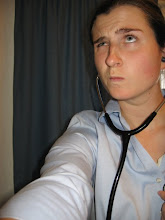HUBIO 540: Cardiovascular System (6 Credits)
Interdisciplinary approach to cardiovascular medicine, including anatomy, physiology, radiology, pathology, medicine, and surgery. Function of the cardiovascular system in health and disease.HUBIO 541: Respiratory System (4 Credits)
Interdisciplinary approach to the respiratory system, including anatomy of thorax and lungs, ventilation mechanics, blood-gas transport, gas exchange, acid-base balance, and the physiology and pathology of obstructive, restrictive, and pulmonary-vascular diseases.HUBIO 542: Introduction to Clinical Medicine (4 Credits)
Advanced instruction in interview technique, history taking, and physical examination, with emphasis on detection of abnormalities.HUBIO 543: Principles of Pharmacology I (5 Credits)
Includes general principles of pharmacology and the specific pharmacology of major drugs acting on the autonomic and cardiovascular systems.
Includes general principles of pharmacology and the specific pharmacology of major drugs acting on the autonomic and cardiovascular systems.
HUBIO 544: Endocrine System (3 Credits)
Normal, gross, and microscopic anatomy and physiology of the endocrine system. Illustrations examining the clinical relevance of homeostasis, feedback, and other controlling mechanisms previously learned. Endocrine integration of metabolism. Clinically important endocrine pathophysiology.HUBIO 562 : Urinary System (4 Credits)
Anatomy, physiology, and pathology of the kidney, ureter, bladder, and prostate; pathophysiology and treatment of common fluid and electrolyte problems; renal pharmacology; major clinical urinary system syndromes, with current diagnostic approaches and therapy.HUBIO 567: Skin System (2 Credits)
Gross and microscopic anatomy. Physiology, protection, temperature control, pigmentation, and photosensitivity. Pathology and genetics of skin abnormalities, including tumors. Introduction to clinical evaluation, including physical examination and illustrating examples of inflammatory, vascular, immunological (including drug hypersensitivity), and neoplastic diseases.MHE 511: Medical Ethics (2 Credits)
Ethics course designed especially for first-and second-year medical students. Study of ethical problems arising in clinical setting of medicine, introducing students to philosophical analysis and argument in practical contexts. Seminar-discussion format with readings from contemporary authors.PEDS 505: Preceptorship in Pediatrics (1 Credit) At the Pediatrics Infectious Disease Clinic at Children's Hospital.
I don't know how many credits that is because I can't count that high. I think it might be over 30 or something like that. Gosh - medical school is making me dumber.
I am really looking forward to the peds preceptorship.




No comments:
Post a Comment